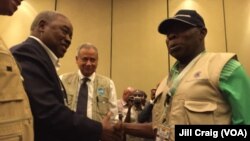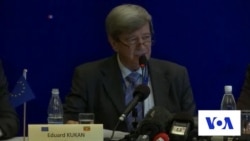Observer missions in Uganda released their findings of the 2016 electoral process Saturday, finding overall that the elections suffered from democratic shortcomings, while still remaining largely peaceful.
Election observers from the African Union, European Union, the Commonwealth, and the Electoral Institute for Sustainable Democracy in Africa (EISA), among others, released their preliminary findings Saturday in Kampala before the final Ugandan election announcement was made.
Former Nigerian President Olusegun Obasanjo led the Commonwealth observer mission to Uganda, and said that "while the presidential elections were competitive with regard to the number of candidates," freedom of movement and assembly affected the fairness of the campaign for opposition candidates.
'Fell short'
“These elections fell short of meeting some key democratic benchmarks … namely, the increased prevalence of money in politics, the misuse of state resources, which led to significant advantages for the incumbent, and the confidence, credibility, and ability of the electoral commission to manage the process effectively and impartially," Obasanjo said.
WATCH: Related video with election observers
Sophia Akuffo, Ghanian Supreme Court justice and head of the African Union observer mission, said the delays in ballot papers arriving at polling stations was quite "inexcusable."
But Akuffo also said she was impressed by Ugandan voters.
“I commend them for their patience and their fortitude and their determination to exercise their votes, because it was hot, humid, and very, very confusing at some of the polling stations that we went to and of course, the materials were late," she said.
Stronger electoral provisions
Rupiah Banda, the leader of the EISA mission, and former president of Zambia, urged for stronger electoral provisions to guard against the use of inflammatory and intimidating language during the campaign.
“As an African, I want to underline the very point of inflammatory language. We just have to learn to express ourselves without showing bitterness and anger, be it by government authorities or leaders, or those prepared to participate in the elections," Banda said.
The observer missions plan to later release their final reports.







